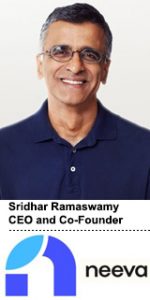 Sridhar Ramaswamy left Google three years ago after a long stint as head of the company’s search and advertising products.
Sridhar Ramaswamy left Google three years ago after a long stint as head of the company’s search and advertising products.
His experience overseeing the world’s largest ad-supported business was among the most powerful roles in advertising, and set him up for practically any leadership role in data-driven marketing.
So it raised eyebrows last year when Ramaswamy co-founded a search engine, Neeva, whose mission is to never include advertising.
“We started Neeva because we love search, the technical problem,” Ramaswamy said. “But we thought the long-term consequences of a primarily ad-supported model for the search engine was more and more about the advertiser, rather than the user or the customer.”
After a year of testing with a 10,000-person user base, Neeva launched to the public on Tuesday. AdExchanger spoke with Ramaswamy about his vision for a new kind of search engine and business model for online monetization.
AdExchanger: Clearly you had experience in the category, but why launch a new search engine?
SRIDAR RAMASWAMY: It’s a remarkable market. It’s close to $150 billion in revenue and is growing pretty briskly at 15% or more year on year.
And it’s absolutely dominated by one player.
We thought having a very different business model as a foundational cornerstone of a new product lets us compete more effectively than a ‘me-too’ search engine trying to recreate the product.
What differentiates Neeva?
We describe it as a private and personalized search experience. And it is a subscription search engine.
There are interesting examples from other industries. Netflix disrupted the established television model with an ad-free subscription. Subscription businesses like Amazon Prime or Costco compete effectively with the likes of Walmart and Target. That philosophy is an important part of how we conceive of Neeva.
Do you have any subscribers right now?We’ve been in a limited trial since last June. We have about 10,000 users so far. But we wanted to bring them along carefully, because we want to make the experience better as we learn and improve.
I wouldn’t call it a general availability until now, because the pricing, how much we’re going to charge, we are still figuring out. But we want it to be broadly available to everyone in the United States this week.
We’re also still in the process of building out the search stack.
When we do launch subscriptions, which we expect to be a few months from now, we think it will be in the ballpark of $5 per month.
Why the commitment to an ad-free search engine?
My long critique is that a model funded by ads is based on collecting massive amounts of information. Over the long term, it’s a model, especially with Google search, where the user experience plays second fiddle to the advertising.
You have the feeling ads chase you around. Or it’s increasingly hard to distinguish an ad from organic content. With Neeva, you never have to think, “Is this an affiliate link?”
And it means our team is focused on how we give you agency as a user. How do we make search work for you?
Many of the sites we link to have ads. And, in fact, search engines operated by browsers often include ad-blocking software. We don’t do that. We don’t think it’s our business to tell other people how to make a living.
Our bet is that a worry-free product will stand out, especially in today’s environment, where there’s a lot of distrust.
Can you explain the revenue-share model?
One of the things we felt strongly about early on was that we needed to be a partner to content creators.
With the big tech platforms, it is very much a take it or leave it relationship. Don’t get me wrong. It is a quid pro quo commitment. Meaning that if publishers provide us with content, for example things like ‘Featured Snippets,’ which Google doesn’t pay publishers for. We’re saying we will reserve a portion of our revenue to be shared with publishers.
Are the ways for marketers to reach users aside from advertising?
We work with the site owners and SEO players to make sure we have up-to-date content. We also have a product called Spaces, which you can think of as a user’s thoughts and images related to a specific topic. We are talking about scenarios where a brand or merchant is uploading offers or links to their Space, and a set of people can follow them if they’re interested.
The beauty of this is we don’t tax anybody. This is just part of how we want the ecosystem to work. We want to connect our customers with content creators on the web, and not be a toll taker.
If you drive a new subscriber to Netflix, which pays for new subscribers from other channels, or you link someone directly to a purchase like an affiliate or typical search link, you’re not earning anything from that?
Correct. We don’t take a cut. That’s the important part, helping you find the information you want. That’s the whole point of a search engine, right?
It isn’t the case with other search engines.
That’s their model.
But our point is, you’re not going to be led to that based on some deal we have. The only deal is with you, the customer. If you follow a streaming service, news company, brand or merchant, they can show up in a search if we believe it’s the most relevant result. But it will always be an organic result.
You mentioned it’s a category dominated by one player – but that’s not for lack of trying – so what’s your plan to gain market share?
Some people like the theme: a private, ad-free search engine. But after using it, they end up liking the clean, uncluttered nature of the product and the focus on delivering personalized results.
It’s one of those cases where you come in for the private experience, but you stay because you feel like this is your search engine.
And, by the way, 10% of the population in the U.S. tries a new search engine every month. So there is active churn.
Where have your early users come from?
Most have come from PR efforts. We’re lucky we haven’t done paid acquisition marketing. I don’t need to tell you, but that’s a pretty expensive way to acquire users.
In terms of early segments where the product has resonated: A lot of parents like the product. They value the idea of a clean, real search experience. We get asked about family subscription plans. And a surprise segment has been seniors. Many are very wary of pay-for-click search engines. There is a continuous game of whack-a-mole with fraudsters targeting seniors in search results.
I worked on search ads a long time; And we tried hard for quality. But the fact of the matter is an automated system that is based heavily on bidding will end up with these cases.













